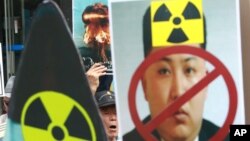The United States is considering more unilateral sanctions against North Korea following Pyongyang's fifth and largest nuclear test.
Speaking in Tokyo Sunday, U.S. Special Representative to North Korea policy Sung Kim said "In addition to action in the (U.N.) Security Council, both the U.S. and Japan" along with South Korea "will be looking at unilateral measures, as well as bilateral" and trilateral measures of cooperation. He gave no details of what those measures might be.
Kim made the comments after meeting with with Japanese Foreign Ministry officials, calling Pyongyang's behavior "destabilizing."
Hours later, North Korea called efforts to add sanctions "laughable," and vowed to strengthen its nuclear program even further. A Foreign Ministry statement said Pyongyang will work to step up its nuclear force "in quality and in quantity." North Korea claims it needs a strong nuclear weapons program to protect itself from U.S. aggression.
South Korea and the United States are reported to have begun their search for radioactive materials following the nuclear test. The investigation team will collect air and water samples to test for radioactive material such as xenon, Yonhap reported.
South Korea said Saturday that the North's capabilities were rapidly expanding, echoing concerns from world leaders about the latest nuclear test.
"It is believed that the North's nuclear capability is becoming more advanced to a considerable level, and at a faster pace," South Korean Foreign Minister Yun Byung-se told senior ministry officials in a meeting Saturday, calling for "more and stronger sanctions."
China also spoke out against North Korea's nuclear tests, saying they were "not conducive to the peace and stability of the Korean Peninsula."
"China urges North Korea not to take any more actions that could exacerbate tensions, and return as soon as possible to the correct direction of denuclearization," Vice Foreign Minister Zhang Yesui told North Korea's ambassador to China.
The latest and possibly strongest North Korean nuclear test ever occurred as U.S. President Barack Obama was returning to Washington from his trip to Asia. Obama condemned the attacks Friday.
The U.N. Security Council met in a closed session Friday afternoon in New York. The council president, New Zealand Ambassador Gerard van Bohemen, told reporters that the 15 members strongly condemned the underground nuclear test and agreed to “work immediately on appropriate measures.”
The explosive yield of Friday's test, a magnitude 5.3 seismic event, was estimated at 10 kilotons.
The last serious talks with North Korea on denuclearization, the six-party talks, ended in 2009.





